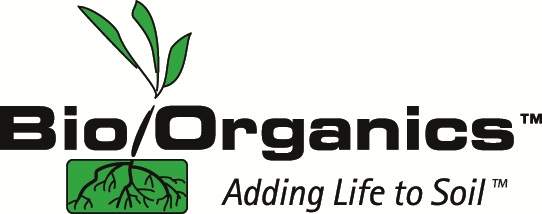Rather than describing the functions of beneficial soil organisms this month, I'd like to announce some additions to our line of mycorrhizal inoculant products. I know that many of you use or experiment with soil biology as an alternative method of growing crops, gardens, and ornamental plants, and you might be interested in these new offerings from BioOrganics, Inc.
First, each of our four basic products - Endo Inoculant, Micronized Endo Inoculant, Endo Root Dip, and Endo/Ecto Landscape Inoculant - will now be available in smaller size containers. In past years our only containers have been 3-lb. jars, suitable for commercial growers but too large for most gardeners. These 3-lb. jars can inoculate 500 new tree or vine transplants, up to 5000 small plants such as strawberries, or up to 3 acres of closely-planted seeds.
The new containers will be 1.5-lb. wide-mouth plastic jars (quart size) and can be direct-ordered individually or in cases of 12, for those of you who have retail stores. We will have these new smaller jars added to our website shop in the next week or so, or you can order by calling our toll free number - 888-332-7676.
The other announcement is that we will begin marketing a new minerals-oriented product, MycoMinerals™. This contains finely ground volcanic-origin rock rich in trace elements, plus humates and 15 types of Endo and Ecto spores. The purpose of this new minerals product is to ensure that garden soils or potted-plant mixtures contain the many minor and trace elements that are essential to full plant nourishment, plus it introduces the important biological agents that help plants uptake these nutrients.
One of the persons who volunteered to test MycoMinerals™ for us this spring said this about it:
"I wanted to thank you for the trial product. My tomato and pepper garden is the most lush I've ever seen. I actually have serrano peppers that are 3 feet tall in 6 weeks. I lost count at over 200 developing tomatoes in my 14 plant plot (after 6 weeks). Your product has produced eye popping results."
We have seen similarly-impressive differences between plants grown in typical potting soils and those grown in mineral-rich soils during our internal trials. Fertilizers do not contain all the elements that plants must have for maximum performance, plus most soils lack the ideal broad spectrum of trace minerals and beneficial microorganisms.
One note about the volcanic rock in MycoMinerals™: It is not, repeat NOT, common lava rock. Lava typically contains very few plant nutrients. Our minerals are from an ancient hydrothermal rock deposit near Crater Lake, Oregon, and analyses show that it contains more than 40 separate elements, including all those regarded as essential to plants.
As would be expected, the minerals are low in N and we suggest adding small amounts of fish-based pellets to the soil as a perfect nitrogen-providing component. See Peaceful Valley Farm Supply - www.groworganic.com - for these pellets. We recommend the 9-3-5 formula, but the 7-7-2 version can also be used.
I encourage all of you to act on your interest in biology-based growing techniques. There is simply no legitimate reason for the chemical sciences to dominate the growing of plants, especially in home gardens or potted plants, and you can easily create super-healthy, high-yielding plants with some attention to soil life.
Cheers, my friends,
Don Chapman
President, BioOrganics, Inc.
